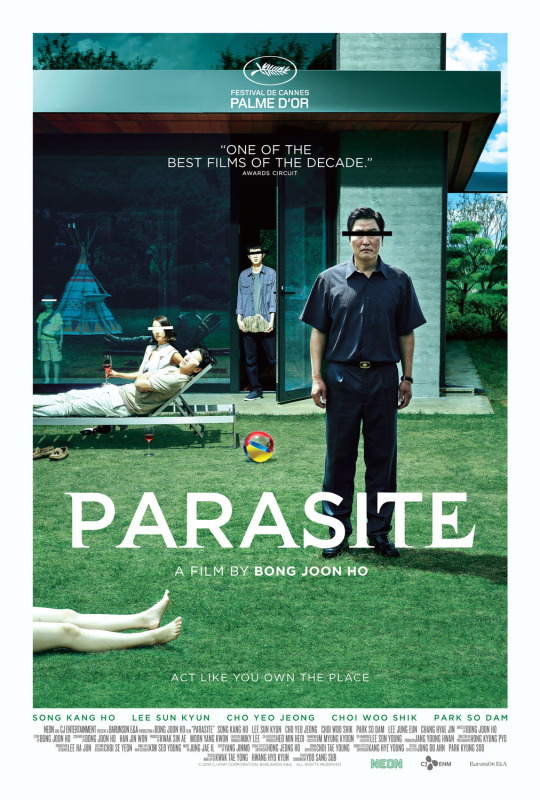#ChoiWoo-shik
Text
Train to Busan (2016)

Train to Busan doesn’t bring any new twists to the zombie genre, but only because it doesn’t need to. By utilizing a unique setting, pitting the zombies against fully-realized characters, and incorporating societal commentary in its story, this feels as fresh as the first time we saw the undead rise again.
Seok-woo (Gong Yoo), the divorced, workaholic absentee father to Su-an (Kim Su-an), agrees to bring her to Busan for her birthday to visit her mother. Onboard the train, a young woman suddenly bites one of attendants. Soon, the infectious disease has reduced most of the passengers to gnashing ghouls and the remainders must work together to survive.
The zombies in this film are more of the 28 Days Later variety, running towards their prey with hands outstretched but otherwise incapable of intelligent thought. This makes for plenty of tension, as the bulk of the action is set on the titular train to Busan. There's nowhere to run except towards the engine room and each compartment forward means less space to maneuver. On the other side of the doors, the passengers see their former friends and loved ones blank-eyed, covered in blood, and ready to pounce. Like in Snowpiercer, the people in charge sat down and really thought of everything that could be done with the setting. Tunnels, stations, the compartments, luggage, passengers, etc.
Every time someone gets overwhelmed and turned, it pains you. Whether it’s Seok-woo and his daughter, the heroic Yoon Sang-hwa (Ma Dong-seok) and his pregnant wife, Seong-kyeong (Jung Yu-mi), the highschool baseball team, the traumatized vagrant (Choi Gwi-hwa) or the elderly sisters Jong-gil and In-gil (Park Myung-sin and Ye Soo-jung), everyone has personality and a miniature story arc that makes them fully-realized people you hope will survive. Even the film's "villain", a self-centered COO (Kim Eui-sung) who consistently hampers the main cast feels real. You either want him to turn around and become a hero, or die a horrible, gruesome death. Either direction will be satisfactory, which means you’re always paying attention.
I found them all so well drawn I couldn't predict who would make it out alive in the end. Korean horror movies are unafraid of going to the really dark place so don’t think the kid won’t be made an orphan, or that the pregnant wife won’t get torn to pieces.
It’s a great-looking picture that keeps moving and bringing new things into the mix. You can enjoy it simply as a horror-thriller but if you look deeper, you’ll notice a subtle message in Train to Busan about what is wrong with Korea (or society in general), and how we should be treating each other, meaning it’s also got great re-watch value. Yes, it’s subtitled, but that little bit of reading you’ll have to do is so, so worth it. This is a superior zombie flick. (Original Korean with English subtitles, July 1, 2018)

#TraintoBusan#movies#films#MovieReviews#FilmReviews#YeongSang-ho#ParkJoo-suk#GongYoo#MaDong-seok#JungYu-mi#KimSu-an#KimEui-sung#ChoiWoo-shik#AhnSo-hee#2016movies#2016films#KoreanMovies#KoreanFilms#zombies#zombieMovies
6 notes
·
View notes
Text
Review : Parasite (2019)

Certain films that pass through the hallowed path that is Cannes Film Festival tend to generate monster levels of buzz, and Bong Joon-ho’s Parasite is no exception to that lucky rule. The buzz around this film was so thick, in fact, that I decided to check this one out simply on the strength of the general publics’ word of mouth. Without reading a review of or seeing a trailer for this film, I walked into my screening, and spoiler alert : my mind was blown.
In South Korea, a family lives in a cramped, semi-basement level apartment, communcally struggling to make the ends meet. After meeting with his friend Min (Park Seo-joon), Kim (Choi Woo-shik) lands an opportunity to tutor Park Da-hye (Jung Ji-so), the daughter of wealthy parents Park Dong-ik (Lee Sun-kyun) and Choi Yeon-gyo (Cho Yeo-jeng). After visiting the family’s lavish home, designed by famed architect (and former resident) Namgoong, Kim is hooked, and immediately enacts plans to employ his family to Park Da-hye’s family in a myriad of sneaky ways. After learning that Park Da-hye’s younger brother Park Da-song (Jung Hyun-joon) is an aspiring ‘artist’, Kim convinces Choi Yeon-gyo to hire Kim Ki-jeong (Park So-dam) as his art tutor, under the guise that she is a friend of a friend. Quickly, the siblings find a way to get Park Dong-ik’s personal driver Yoon (Park Geun-Rok) fired and replaced by their father Kim Ki-taek (Song Kang-ho). After a bit of research and sabotage, the siblings also managed to get legacy housekeeper Moon-gwang (Lee Jung-eun) fired and replaced with their mother Kim Chung-sook (Jang Hye-jin). With Kim’s family in place, and having convinced the family they are employed to that they are strangers, the group begins having visions of occupying a home like the Namgoong home. Their world is shattered, however, when Moon-gwang returns under strange circumstances during a family camping trip in honor of Park Da-song’s birthday, and the fallout causes waves that are felt by all families connected to the home.
This film is a whip-smart, darkly comedic look at materialism and classicism, with a pinch of suspense and tension sprinkled in by way of deceit on multiple levels. The Park family, while charming in their own right, clearly value objects more than people, with their fascination on American objects (read : consumerism) permeating to the point that they don the Kim family with American names, as if they are toys/servants. Despite this subtle power move, the levels of deceit used by the Kim family throw the power struggle on its head, with their ruse being implemented so quickly and efficiently that an artificial trust is built between the two parties. The classicism is presented via the extremely wide divide that exist between the help and the helped, with both the Kim family and Moon-gwang hiding ENORMOUS secrets literally right under the nose of the Park family due partly to the poorer familys’ need to do whatever they must to survive, and partly to the blind eye that the Park family turns on the poor and the old, with Park Dong-ik literally being repulsed by the smell of the old and the poor.
This film would not work nearly as well as it does without the monstrous presence that the house exudes, with its notorious reputation as a product of a famous architect serving as a distraction to its own set of deep secrets. The design of the home fits the decadence of the Park family, with its breathtaking aura being fueled by a mixture of simple (but grand) design that houses a litany of objects and a beautifully manicured lawn. Moon-gwang’s return, however, opens a door that is both figurative and literal, showing that even those that are implementing a dangerous ruse have room to be surprised and shocked. The home gives the Park family such a sense of comfort that it almost forms a literal haze around them, with young Park Da-song being the most perceptive member of the family due to his age and innocence being a strong protector against the fog of materialism and the jadedness that life experience creates.
The writing in this film is textured and tight, with plenty of seeds planted that pay off brilliantly throughout the run of the movie. The characters are as intelligent as they are funny, which allows them to play slightly over the top without sacrificing a sense of realism or damaging the ever-present tension that grows as the story unfolds. The cinematography is fluid and flowing, as the camera moves among those that inhabit the world of the film like an observant spectre (much like some of the characters find themselves eventually doing). The subtle undertones presented in the film feel like a reward to the audience, as Bong Joon-ho is careful not to spoon feed viewers or beat them over the head with information, relying instead on revealing things slowly and timely as the story progresses. The balance found in the parallel locations of the semi-basement level apartment and the grand Namgoong home works well, with the big secret that the Namgoong home hides serving as a bridge that connects everyone. The final half-hour of this film is as gripping and captivating cinema as anything I’ve seen all year.
The Kim family manages to be incredibly engaging despite being the true antagonists of the film (though the film really has no protagonists). Song Kang-ho finds a way to exude pride that is surrounded by a reservation and acceptance of his squalid situation, with Jang Hye-jin’s strong personality offsetting Song Kang-ho's sadness. Choi Woo-shik brings a teenage curiosity that he mixes with the eye of a hustler and opportunist, and Park So-dam runs the entire show with a keen mix of an assorted skill set, a sharp and actively observant state of mind, and a chameleon-like personality. As for the Park family, Jung Ji-so displays a proper level of boy-crazy tendencies, and Jung Hyun-joon lets his child-like mischief fuel his performance, making his character reveals and callbacks hit harder when they are played. Lee Sun-kyun exudes a quiet strength fueled by an indifference to nearly everything, and a shallowness that eventually becomes his downfall. Cho Yeo-jeong is arguably the most sympathetic of all the characters, with the love for her family playing against her deficiencies as a mother, wife and housekeeper, essentially making her a trophy wife with minor levels of autonomy. Lee Jung-eun plays her opening background roles strongly, making her return to the narrative a reveal that opens entirely new pathways of audience experience, judgement and tension. Appearances by Park Myung-hoon, Park Geun-Rok, Jung Yi-seo and Park Seo-joon round out the film.
This film is a hard one to talk about without revealing too much, and although I doubt that it would damage the experience of seeing this movie if you go into it with a bit of knowledge, this dish is one that is best served without prior knowledge in order to achieve maximum enjoyment. If you’re a fan of the work of Yorgos Lanthimos, or you like your humor mixed with a respectable level of shock and subtle social commentary, then Parasite is your film.
#ChiefDoomsday#DOOMonFILM#BongJoonHo#Parasite#SongKang-ho#JangHye-jin#ChoiWoo-shik#ParkSo-dam#LeeSun-kyun#ChoYeo-jeong#JungJi-so#JungHyun-joon#LeeJung-eun#ParkMyung-hoon#ParkGeun-Rok#JungYi-seo#ParkSeo-joon
2 notes
·
View notes
Text
Time to Hunt
Movie Information: Wanting to leave their dystopian world behind for a faraway paradise, three outlaws plot a money heist — and draw the attention of a vicious killer.
Read the full article
#123movies#9movies#AhnJae-hong#ChoSeong-ha#ChoiWoo-shik#Free#gomovies#gostream#KimWon-hae#LeeJe-hoon#losmovie#movie25#movie4k#movietv#ParkHae-soo#ParkJung-min#primewire#putlocker#putlockers#putlockertv#shockshare#sitename#solarmovie#Watch사냥의시간#watch32#yesmovie#사냥의시간Online
0 notes
Text
Parasite (2019)

Parasite is just as much twisted fun to watch the second time as it was the first. It’s a diabolical thriller and from a technical standpoint, it’s incredible. Whether you pick up on the political commentary right away or it only sinks in later doesn’t matter at all.
Kim Ki-taek (Song Kang-ho), his wife Chung-sook (Jang Hye-jin), their son Ki-woo (Choi Woo-shik), and daughter Ki-jeong (Park So-dam) make ends meet by snatching up whatever job comes their way. One day, Ki-woo finds a job tutoring the daughter of the wealthy Park family, Da-hye (Jung Ji-so). Thanks to his forged documents, her parents (Lee Sun-kyun and Cho Yeo-jeong) suspect nothing, which gives the rest of the Kims ideas…
You’re often unsure if you should be laughing or if this story is horrifying. In one of the first scenes, the Kims notice the city is fumigating the streets. Instead of closing the windows, they open them - hoping to get rid of the infestation in their apartment for free. It doesn’t go well. Right away, you know volumes about these people. They’re desperate but savvy and there’s no opportunity they won’t take advantage of. You’ve got an entire movie in just those few minutes but it’s just the beginning.
Director Bon Joon-ho (whose Snow Piercer I love) tells a story that’ll have you tearing out your hair in anxiety. As the Kims leech off of the Park household, you're unsure how to feel. The way they carefully orchestrate cons within cons and flawlessly carry them out, often improvising and turning what other would see as stumbling blocks into opportunities is admirable - if that's the word. It also makes them reprehensible. Our protagonists will they step on anyone to get what they want, as illustrated in the film’s best moment, a fast-paced montage in which they go after the housekeeper, Gook Moon-gwang (Lee Jing-eun). And then, the film once again makes you revise your feelings by revealing more about the people being fooled. The homeowners are a troupe of dolts who will be fine regardless of this elaborate deception. The more you know them, the more you realize the crooks they’ve fallen prey to are not much worse than they are. These snobs are so oblivious to the world they deserve to be taken down a peg.
Initially, I was unsure what to make of the ending. It seemed too idyllic, too clean. Now I realize that’s exactly the point. That conclusion is a fantasy. The dark truth is, things will never turn out that way. Even if it did, one prison would merely be substituted for another.
Parasite makes you think about the ever-growing gap between the rich and poor in a manner so clever you don’t even realize you’re learning something. It gives this picture great re-watch value. Or you can simply enjoy it as a series of cons and dark twists. Either way, it's great fun. (Original Korean with English subtitles on the big screen, March 10, 2020)

#Parasite#PasiteMovie#Movies#films#Reviews#MovieReviews#FilmReviews#BongJoon-ho#HanJin-won#SongKang-ho#LeeSun-kyun#ChoYeo-jeong#ChoiWoo-shik#ParkSo-dam#LeeJung-eun#Jang-Hye-jin#2019movies#2019films
7 notes
·
View notes